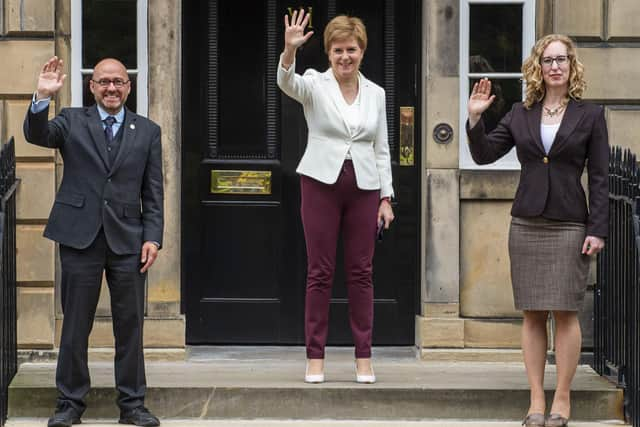SNP leadership race: What is Nicola Sturgeon's legacy on the climate crisis and what will her successor need to do
Regardless of political allegiances, most would agree she put environmental issues high on her list of priorities and has been an outspoken advocate on the need to tackle climate change.
Under Sturgeon’s premiership, the Scottish Government became the first in the world to declare a ‘climate emergency’, acknowledging the existential threat from global warming caused by human activities. Many others across the world have since followed suit.
Advertisement
Hide AdAdvertisement
Hide AdThe outgoing First Minister has pitched Scotland as a global leader on green action, setting legally binding targets that remain among the most ambitious anywhere.
The aim to reach net zero by 2045 is five years sooner than both the UK’s 2050 deadline and the date set out by the United Nations to meet the Paris Agreement objectives.
Her Government has committed to reduce reliance on ‘dirty’ fossil fuels and move to low-carbon renewable energy, clean up transport and reverse loss of nature.
No fracking or other unconventional oil and gas activity is permitted to take place onshore in Scotland, while new petrol and diesel vehicles are due to be phased out by 2030 and the rail network decarbonised by 2035.
Targets for tree-planting and restoration of peatlands have been upped, plans put in motion to protect more parts of the sea, and beavers have been brought back to the wild during her tenure. A green jobs revolution has also been promised.


Sturgeon also made headlines at the COP26 climate summit in Glasgow when she announced a £2 million grant for poor countries suffering loss and damage due to climate change, making Scotland the first developed nation to commit funding for the controversial reparations.
And despite the importance of Scotland’s rich North Sea resources to her party’s independence plans, the Scottish Government’s new draft energy strategy suggests a “presumption against” new oil and gas exploration.
At COP27 in November, Sturgeon said: “We absolutely cannot go on with unlimited extraction of fossil fuels. I make this point in Scotland, and because of the history of Scotland with oil and gas, it is not uncontroversial at times. I don’t think we can just go on with fossil fuels – we need to move away.”
Advertisement
Hide AdAdvertisement
Hide AdThere has been no shortage of green ambitions, but delivery has been proving trickier.


Overall, Scotland’s emissions have been cut by more than half – achieving the 2020 interim target for a 56 per cent reduction from 1990 levels. However, much of this success has been put down to ‘easy wins’ such as ending coal-fired power generation and the impact of the Covid pandemic.
Some other sectors – transport, agriculture and homes – remain stubbornly hard to decarbonise and limits on air pollution have often been breached.
Analysts have warned long-term goals are at risk due to inadequate plans for how to achieve them. A recent report on Scotland’s progress towards its climate goals by the Climate Change Committee (CCC) – independent expert advisers to all the governments across the UK – was damning.
It concluded the “bold” emissions reduction targets were “in danger of being meaningless” due to the lack of a clear delivery plan and “coherent explanation” for how the country will meet them. It warned progress had “stalled” and Scotland was losing its lead on climate action.
It remains to be seen whether the ship can be steered back on course once Sturgeon quits her post.
Some of the key figures in Scotland’s environmental sector have been reflecting on the First Minister's legacy and the challenges which will face her successor, who is due to be appointed on March 27.
“From banning fracking to asking how soon to phase out oil and gas in the recent energy strategy, the First Minister has started to steer the SNP away from its long-standing allegiance to fossil fuels,” said Mary Church, head of campaigns at Friends of the Earth Scotland.
Advertisement
Hide AdAdvertisement
Hide Ad“In doing so she diverged from the UK Government’s climate-denying policy of drilling every last drop of oil and gas, and added weight to the campaign to stop the Cambo field and other offshore extraction. Her successor must continue in this direction and swiftly rule out support for any new fossil fuels, and put a plan in place to end reliance on oil and gas within this decade.”
She added: “It's hugely welcome that Sturgeon's administration adopted and centred the principle of protecting workers and communities as we transition away from oil and gas. This commitment to a just transition has broken new ground, but has yet to actually deliver the necessary decent green jobs and protections for the workforce.” She said the new leader must “show how rhetoric will be turned into action to actually deliver a fairer, greener Scotland”.
Mike Robinson, chief executive of the Royal Scottish Geographical Society and chair of environmental coalition Stop Climate Chaos Scotland, said: “During Nicola Sturgeon's leadership we’ve seen more ambitious targets to reduce emissions, Scotland becoming the first ever country to commit funding to help those experiencing extreme climate impacts recover, a Just Transition Commission established to ensure we move to a low-carbon economy in a fair way that benefits all, and a shift away from a policy of maximum recovery of oil and gas from the North Sea.
“At a time when we urgently need climate leadership, having a First Minister who has championed these issues and openly recognised the link to human rights, equity and justice has been welcome. By making climate a priority and delivering much positive rhetoric, the FM has helped drive action both in Scotland and internationally.”
Robinson says her replacement must build on the work so far, keep climate as a government priority and ensure Scotland is “a true champion of climate justice” by driving action across all sectors and supporting “difficult decisions” needed to reach net zero.
“We’ve moved away from a time for warm words and positive intentions,” he said. “We are firmly in the time for action, and this is something that has been lacking in recent years.”
Deborah Long, chief officer for the Scottish Environment Link coalition of charities, said the environment “moved to the top of the political agenda” under Sturgeon.
“In particular, the First Minister has led the call to tackle the nature crisis alongside addressing climate change,” she said.
Advertisement
Hide AdAdvertisement
Hide Ad“It is imperative that the new First Minister ensures we have strong, ambitious and legally-binding nature targets with which Scotland protects and restores its environment for future generations.”
Sturgeon was “a leader in calling out global injustices”, according to Frances Guy, chief executive of Scotland's International Development Alliance, breaking ground by creating a loss and damage fund and becoming one of first nations to sign up to UN sustainable development goals.
But there is much more work to be done. “Scotland is lagging behind in many of its climate targets and we need to see the next First Minister take bold action to reduce our climate impact,” he said. “We need to see more consideration of the impact of decisions we make here on those elsewhere in the world.”
Pete Ritchie, from sustainable food campaign group Nourish Scotland, said Sturgeon had helped put what we eat on the international environmental menu.
“Food is rarely a first-tier issue, unlike health and climate – though arguably it’s the single biggest influence on both,” he said.
“But the Good Food Nation Act, which was passed with cross-party support last year, might yet turn out to be a significant part of the First Minister’s legacy.” The act has “taken food out of the ‘rural’ box and made it a cross-cutting issue like climate change” and influenced sustainable food systems laws in Europe, he said.
North Sea representatives were less effusive. Dave Whitehouse, chief executive of industry body Offshore Energies UK, said: “We would like to thank Nicola Sturgeon for her personal service and dedication to Scotland over the last eight years, particularly her leadership during the pandemic.
“We look forward to welcoming the next first minister and SNP leader in due course, and we will continue to urge them and their administration to recognise the vital role of the offshore energy sector to Scotland’s economy and to help realise a successful offshore energy future which benefits everyone from Aberdeen to Glasgow and from Sullom Voe to Gretna.”
Comments
Want to join the conversation? Please or to comment on this article.